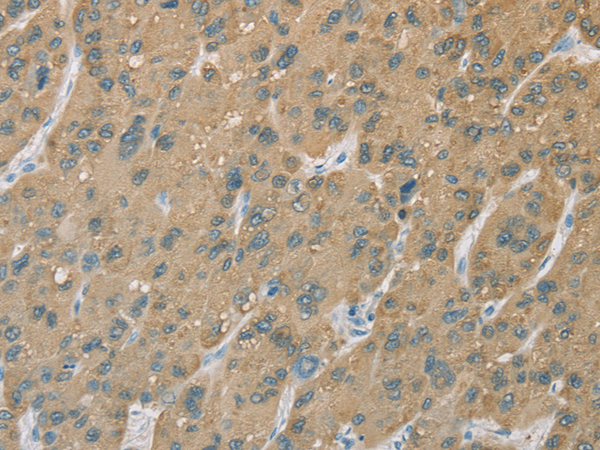
| WB | 咨询技术 | Human,Mouse,Rat |
| IF | 咨询技术 | Human,Mouse,Rat |
| IHC | 1/50-1/200 | Human,Mouse,Rat |
| ICC | 技术咨询 | Human,Mouse,Rat |
| FCM | 咨询技术 | Human,Mouse,Rat |
| Elisa | 1/2000-1/5000 | Human,Mouse,Rat |
| Aliases | CPC9; CYP2C; CYP2C10; CYPIIC9; P450IIC9 |
| Host/Isotype | Rabbit IgG |
| Antibody Type | Primary antibody |
| Storage | Store at 4°C short term. Aliquot and store at -20°C long term. Avoid freeze/thaw cycles. |
| Species Reactivity | Human |
| Immunogen | Fusion protein of human CYP2C9 |
| Formulation | Purified antibody in PBS with 0.05% sodium azide and 50% glycerol. |
+ +
以下是关于CYP2C9抗体的模拟参考文献示例(仅供学术参考,建议通过PubMed或Google Scholar查询真实文献):
1. **文献名称**: *Development of a Monoclonal Antibody for Specific Detection of CYP2C9 in Human Liver Microsomes*
**作者**: Smith A, et al.
**摘要**: 本研究开发了一种针对人CYP2C9酶的高特异性单克隆抗体,并通过Western blot和免疫组化验证其在肝微粒体样本中的应用。抗体成功区分了CYP2C9与其他CYP亚型,为药物代谢研究提供工具。
2. **文献名称**: *CYP2C9 Genetic Polymorphisms and Protein Expression Analysis Using Antibody-Based Assays*
**作者**: Johnson R, et al.
**摘要**: 通过ELISA和免疫荧光技术,分析不同CYP2C9基因型(如*CYP2C9*2和*CYP2C9*3)个体的肝组织样本,发现特定突变导致酶蛋白表达水平降低,与华法林代谢差异相关。
3. **文献名称**: *Application of CYP2C9-Specific Antibodies in Personalized Medicine: A Clinical Cohort Study*
**作者**: Lee H, et al.
**摘要**: 在临床队列中使用CYP2C9抗体评估患者酶表达水平,结合基因分型数据,发现抗体检测可辅助预测抗凝药物剂量需求,支持个体化用药策略。
4. **文献名称**: *Comparative Evaluation of Commercial CYP2C9 Antibodies for Research and Diagnostic Use*
**作者**: Garcia M, et al.
**摘要**: 系统比较了5种市售CYP2C9抗体的灵敏度和特异性,指出部分抗体存在交叉反应性,并推荐特定抗体用于质谱联用定量分析。
**建议**:如需真实文献,可使用关键词“CYP2C9 antibody + application/validation/polymorphism”在学术引擎中检索,并筛选近五年高被引论文。
The cytochrome P450 2C9 (CYP2C9) enzyme, part of the CYP450 superfamily, plays a critical role in metabolizing approximately 15-20% of clinically prescribed drugs, including warfarin, phenytoin, and NSAIDs, as well as endogenous compounds like steroids. Genetic polymorphisms in the *CYP2C9* gene significantly influence enzyme activity, leading to interindividual variability in drug metabolism and therapeutic outcomes. Over 60 variant alleles have been identified, with *CYP2C9*2 and *CYP2C9*3 being the most clinically relevant, associated with reduced enzymatic function and increased risk of adverse drug reactions.
CYP2C9 antibodies are essential tools for studying enzyme expression, localization, and activity in tissues. They enable detection of protein levels in liver samples, aiding pharmacogenomic research to correlate genotype-phenotype relationships. Such antibodies also support diagnostic assays to identify poor metabolizers, guiding personalized dosing strategies. In drug development, they help assess CYP2C9-mediated drug interactions by identifying inhibitors or inducers.
Challenges in CYP2C9 antibody applications include cross-reactivity with homologous CYP isoforms (e.g., CYP2C19) and variability in assay standardization. Recent advances in monoclonal antibody engineering aim to improve specificity. Ongoing research focuses on elucidating structure-function relationships and ethnic-specific allele distributions to refine precision medicine approaches. Collaborative efforts between pharmacologists, clinicians, and biotechnologists remain crucial to optimize CYP2C9 antibody utility in translational research and clinical practice.
×